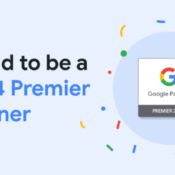/
/
An Intern’s Intro to SEO
When I started as an intern at TargetClick earlier this month, I had little to no background in search engine optimization (SEO). Considering SEO is one of the six key services provided by the company I had only just begun working for, I had to learn everything there was to know as quickly as possible.
First, what exactly is SEO? Millions of searches are executed every single day and SEO ensures that internet users will be directed to your site. Hardly anyone peruses past the first page of Google search results. The goal of optimizing search results is to get organic listings to display near the top page of a search. Not only is this crucial to obtaining traffic but it is also critical to acquiring the right traffic.
Much can be determined about a potential buyer by the keywords they use during a search. For example, a person that searches for something general like “new cars” is in the beginning stages of the sales process. Someone searching for a specific year, make and model of a vehicle, however, is further down the sales funnel and will likely make a purchase in the near future. With SEO, users in all phases of the buying process can be directed to a site that suits their needs at that time simply by the keywords entered into the search bar.
The fact that internet users are beginning to incorporate search queries into their daily routines makes search engines an incredibly powerful marketing tool. According to a 2011 PEW Internet Study, the percentage of web users who use search engines on a daily basis is 59% which has risen from just one-third of all users a decade ago. As these numbers continue to increase, so does the importance of search engine optimization.
Understanding how search engines work is imperative because it helps one to understand how to optimize the content of pages to make them easier to find. Search engines sort results based on importance and relevance. Importance is typically determined by a page’s popularity while a variety of factors beyond just basic keywords contribute to relevance.
Although sites should be created primarily for the user, they should be readable by a search engine. Webpages should be useful and informative instead of merely existing as keyword stuffed entities comprised of unoriginal content. Simple steps like ensuring your page contains a clear and accurate description of its content in <title> elements and meta tags is a huge part of the optimization process. Apparent link hierarchies of a site with human-friendly URLs improve the ability of users to navigate a site as well as a search engine to locate it.
Before I started at TargetClick, I had no idea what an integral role search engines played in marketing. For instance, I never click on a link that isn’t in the top three of a search query. Studying SEO has made me realize that this is true of most internet users. How your site stacks up in a Google search can ultimately make or break a business and SEO is vital to ensure that your organic listings are near the top. More importantly, not only does SEO produce traffic for a business through improved listings, it generates incredibly targeted traffic that is highly anticipated to convert into sales. After all, a search engine is a vehicle customers are already using. SEO is an avenue that will direct them to your business.
Recent Posts
Mudd Advertising
Let’s leverage!
Mudd Advertising
Politics Schmolitics!
Mudd Advertising
Mudd has been promoted to Google Premier Partner
All Categories
Tags
anonymous website visitor identification
automotive
branding
cable
case study
chevrolet
chevy
data
digital marketing
direct marketing
display
dynamic inventory display
facebook
first party
google
google analytics
google premier partner
internet marketing
local seo
Matthew Moody
media
mobile search
mobile seo
MUDDid
online marketing
online video
organic
organic search
pay per click
political
ppc
promotion
retargeting
search engine marketing
search engine optimization
sem
seo
social advertising
social media
social media marketing
strategy
traditional marketing
traditional media
Volunteer Spotlight
youtube




